To follow on from my earlier post Are vets nutritionists, I’d like to share an excerpt by Sydney veterinarian Doctor Tom Lonsdale as published on ABC News (you can read the article here).
In the article Doctor Lonsdale discusses the influence of corporate brands Hills and Royal Canin on veterinary studies. These corporations influence veterinary students at the start of their career by providing lab gear and subsidised pet foods, but what’s most concerning is their influence over curriculum and what our vets are taught.
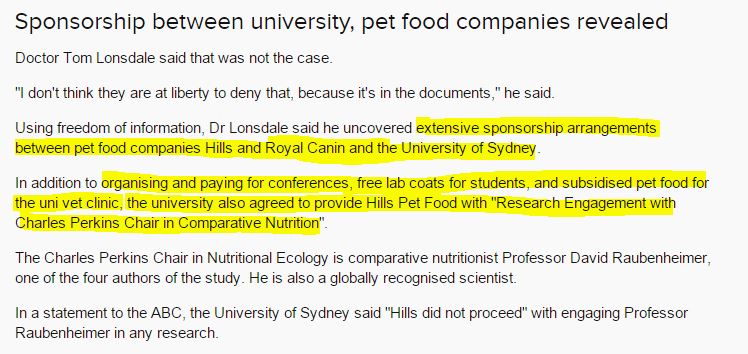
Sponsorship of veterinary studies from Hills and Royal Canin
It’s easy to teach a veterinary student a cat with renal failure needs a low protein (arguable), low phosphorous diet, with the commercial solution being Hills k/d. It’s a fallacy – a cat with renal failure shouldn’t be fed a dry food, period, regardless of what scientific percentages it adheres to. Veterinary professionals aren’t taught why the food is low protein, with the reality being it contains less meat (an expensive ingredient). That’s not a staple diet for a carnivorous animal to retain health.
The involvement of corporations into veterinary studies means they can influence what and what isn’t researched in their favour, which is largely the problem with the pet food industry today. If vets are trained during their studies to sell particular brands, then it grooms them to sell products to consumers without any real knowledge of the food itself.



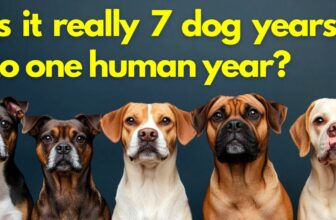
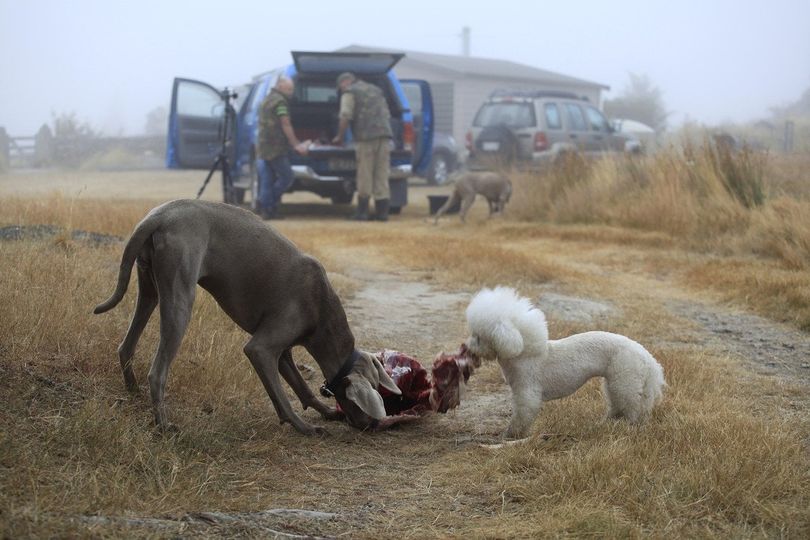
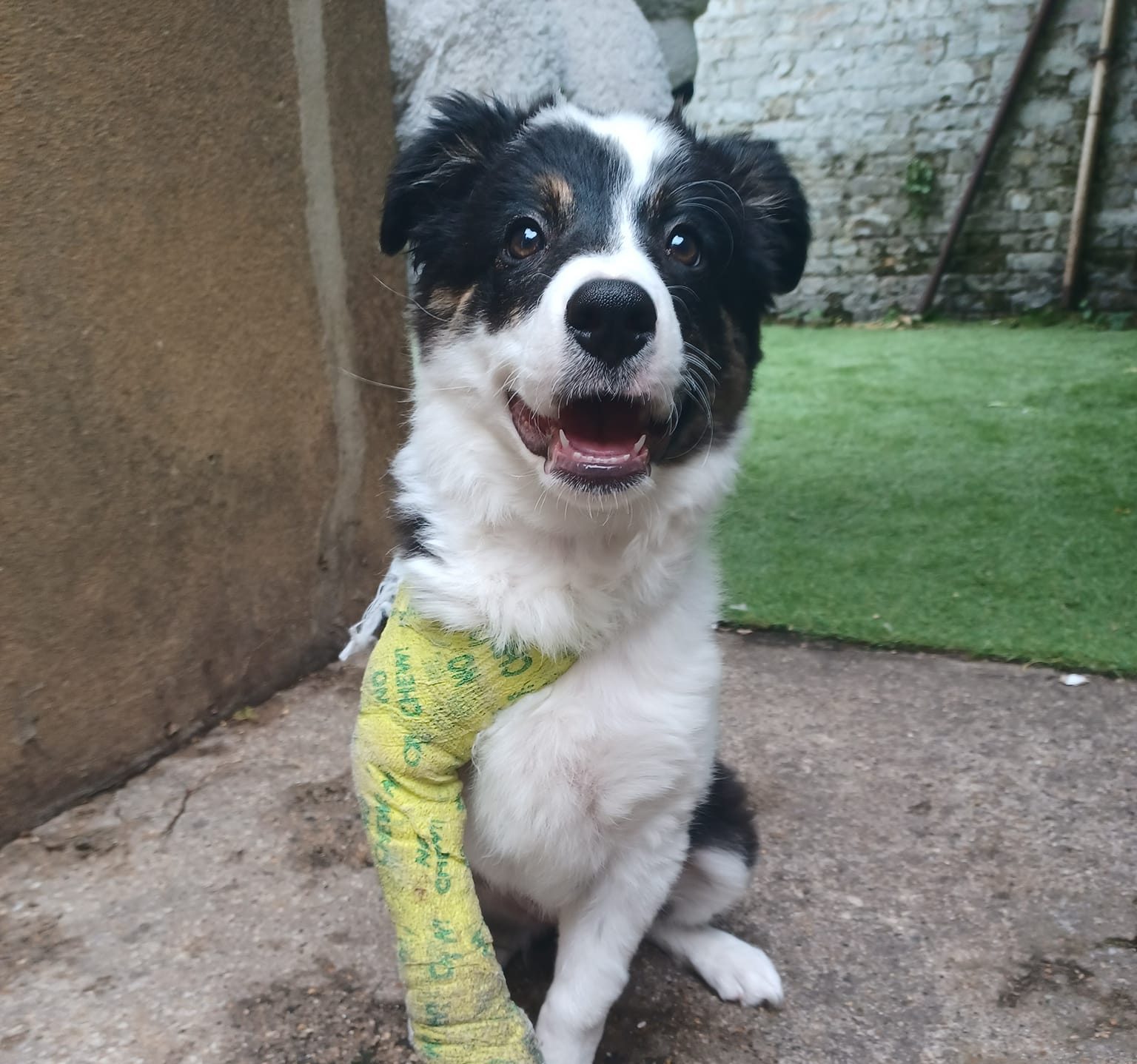
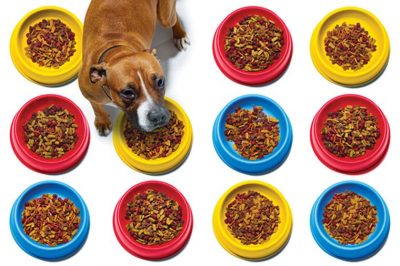
I recently watched a youtube video on the Norwegian fish industry. To say the least it horrified me. Some of their product may be finding it’s way into local human & pet foods. https://www.youtube.com/watch?v=RYYf8cLUV5E
I urge you to watch because the source of products in all our foods is vital for our health whether we’re a human or a much beloved cat or dog. It has caused me to cease eating farmed salmon, even from Tasmania. In fact I will not eat fish except locally caught in the ocean – which even then has issues.
The best course of action at that point is to simply eat the fish with the least amount of toxins, if your like me and only like certain fish flavours that becomes a very big problem, so I eat it sparingly instead.
Some nasty shyt happening in the world these days and supposed humane slaughterhouses with spy videos of what these actually really look like and how they really treat animals it’s sick.
Purina and Mars the pet food super giants taking over the Internet spouting nonsense on websites people believe are the real deal, spouting sometimes deadly information that puts pets health in jeopardy and taking over vet offices, mistreating pets and charging huge amounts for stuff that’s not even worth that much to begin with. Think $10,000 for a procedure that another vet clinic did for $800.
Over vaccination of pets and food borne crisis on the rise, increase of diabetes, cancer and urinary problems in wrong food given for species who thrive on moisture rich diets and the fact that carbohydrates are something pets need but they don’t.
In fact I even read a comment of someone buying grain free because it doesn’t have carbs, only it does because kibble requires starch and starch is carbs.
To have no carbs would equal raw, kibble will always have carbs, some just have less but you can’t be rid of it completely.
I’ll stop talking now haha before I write a wall of China sized comment.
Speaking of China or Thailand don’t buy pet treats from these countries.
Think you’re right in all you say Edanna. Have to laugh tho, backpackers come to our town because it’s lovely & they’ve been seen buying dog & cat food to survive on! Laugh we might, but it’s troublesome too.
Every creature needs carbs surely! & carbs are in raw food too. Have always avoided any food from China. Did you see the videos of Asians making rice out of plastic to send to Africa? I shudder at what some people will do to others. Our mogs got quite ill for a week or 2 until we twigged he was chewing plastic bags! He got the “no” treatment until he obeyed instantly. OK now. Cheers !
Manufactured dog food is rubbish, and the specialised ‘renal diets’ from the big manufacturers in particular are a scam! Its far cheaper and healthier to feed raw food.
My 16 year old dog was diagnosed with final stage kidney failure last october (not eating, seizures etc). I was told by the vet she had only 5 days to live if we took her home, and that “the hills k/d science diet was the only food that would not offend her kidneys.” i on the other hand could make no sense of exposing her kidneys to highly processed, dry food of uncertain content!
i took her home, put her on a carefully balanced raw diet of meat and veggies, homeopathic tonics and herbs i found overseas, exercise and hydrotherapy….and six months later she is getting stronger every day.
Absolutely right Nat. How can a processed dry food within minimal moisture content and made from waste products help an animal with kidney problems? It just can’t.
It’s not a surprise that so many people question pet food, as it’s such a lucrative market I have always wondered/and I do admit a little suspicious why vets…and many other people recommend Hills Dried Food. My dogs did not like it at all, and I tried several times. Like so many products..there is a big mark up and incentive for recommending a particular product. My ‘gut feeling’ is that Hills Pet Food is one of those ‘good profit’ products. I bought Ivory Coat, venison for the first time, and my 2 dogs love it..it is also grain free. Since then my dogs have not had the dreadful itchy skin, that just drove them crazy…and myself. I have also changed their shampoo. At this point things havn’t been better, my Maltese szitsu are 12 years.
My cat that has just passed at 19 years lived on human grade Roo meat , beef and chicken plus some biscuits he died of renal failure vet said put him on special biscuit as roo was too high in protein I kept feeding him the same, . His age was a good age .
My three Russian blues died also at 18 and 19 yrs on the same diet, they must have raw meats and not rubbish meat
Trying to find out how much sodium is in dog food is near impossible.
Some manufacturers list salt or sodium percentage. You can calculate sodium from the salt percentage by multiplying by 0.4. i.e. 1g of salt per 100g (or 1% salt) equates to 0.4g (0.4%) sodium.